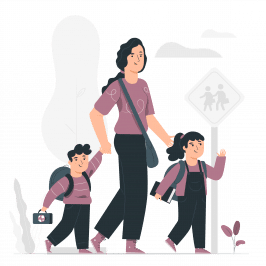In family law and public policy, child support (or child maintenance) is an ongoing, periodic payment made by a parent for the financial benefit of a child (or parent, caregiver, guardian, or state) following the end of a marriage or other relationship. Child maintenance is paid directly or indirectly by an obligor to an obligee for the care and support of children of a relationship that has been terminated, or in some cases never existed. Often the obligor is a non-custodial parent. The obligee is typically a custodial parent, a caregiver, a guardian, or the state.
In most cases, a non-custodial parent is responsible for child support payments even if they do not wish to have a relationship with the child. Courts have maintained that a child’s right to financial support from parents supersedes an adult’s wish not to assume a parenting role.
Depending on your circumstance and situation, you may choose to sue to claim for child support or not. While a good percentage of non-custodial parents are responsible enough to provide for the child’s well being and upbringing, we have an emerging trend favouring deadbeat parents.
A deadbeat parent is a pejorative term referring to parents of any gender who do not fulfill their parental responsibilities, especially when they evade court-ordered child support obligations or custody arrangements. The gender-specific deadbeat dad and deadbeat mom are commonly used to refer to men and women who have fathered or mothered a child and intentionally fail to pay child support ordered by a family law court or statutory agency such as the Child Support Agency.
In Kenya, should you choose to pursue the law in favour of support for your child, I recently read a very well written summary from the Daily Nation’s Saturday Magazine of June 9, 2018 titled ‘Abandoned mothers, deadbeat dads, and how to pin them.’ The expert, an advocate of the high court explains:
Article 53 of the Constitution states, “A child has a right to parental care and protection, which includes equal responsibility for the mother and father to provide for the child whether they are married to each other or not.” The parents are required to provide food, clothing, shelter, education and medical expenses.
A good starting point would be to get a lawyer to try a soft approach, starting with a ‘gentle’ letter done in good faith. The aim is not to be on the warpath with your baby daddy, but to have him take up his part of responsibility. You can then sit down and come up with a Parental Responsibility Agreement, which binds both parties to the child’s needs. Once both parents are clear on who takes up what, the lawyer then registers the Parental Responsibility Agreement document in court, which then functions like a court order.
The expert further opines her reasons why women should not shy away from asking for the child support legally. She explains,
I have heard it said that the main obstacle is legal fees, but the Children’s Courts have the lowest filing fees. It is also possible to self-represent, and there are several organisations which offer free legal advice and representation.
It is advisable to think long-term, in terms of what you are paying in legal fees vis a vis what it will ultimately cost you to let the other parent go scot-free.
Currently, the children’s court also has a panel of mediators who help the parties craft an agreement without a protracted court battle.
She highlights the following legal entities that help single parents to seek legal assistance;
The National Legal Aid (and Awareness) Programme (NALEAP) one. The Centre for Rights Education and Awareness (CREAW) also represents women in court, and CLEAR, which is a project of the Kenya Christian Lawyers Fellowship. FIDA also help by sending you to lawyers who are willing to assist with such cases pro bono.
In my case, I was persuaded that I had made a mistake and the relationship was not of God and was not going to get me to the place God designed for me. The financial provision was complicating my life as it came with conditions of contact and visitations. I choose to forego this benefit for the sake of healing and moving forward with my life. What followed was several-year’s season of immense financial difficulties and it took a while to get my footing, but when I did, I was at a far better place emotionally to be able to focus on bringing up my child in a godly way.
As we have seen in the previous chapter, an emotionally stable mom or dad is able to bring up an emotionally stable child. The overall success and well being of your child is based on your emotional stability. Since only you and God know the kind of man or woman you are dealing with, it is entirely up to you to decide on whether to pursue child support or not.
And if you feel stuck on what to do or need clarity and wisdom, hold God to His Word in James 1:5-8 (AMP emphasis added)
If you lack wisdom to guide you through a decision or circumstance, ask of our benevolent God, who gives to everyone generously and without rebuke or blame, and it will be given to you. But you must ask for this wisdom in faith, without doubting God’s willingness to help you, for if you doubt you are like a billowing surge of the sea that is blown about and tossed by the wind. If you are like that, you ought not to think or expect that you will receive anything at all from the Lord, being a double-minded man, unstable and restless in all your ways, in everything you think, feel, or decide.






